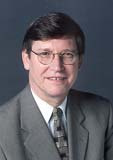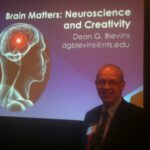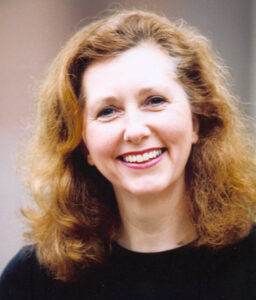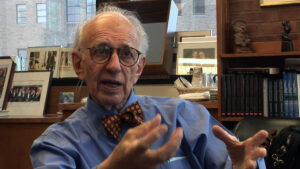Plenary #1: David Hogue
Brain Matters: Practicing Religion, Forming the Faithful

Sponsored by the Religious Education in Academic Disciplines and Institutions Forum. Moderator, Dori Baker
David Hogue, Professor of Pastoral Theology and Counseling at Garrett-Evangelical Theological Seminary in Evanston, Illinois, is the author of Remembering the Future, Imagining the Past: Story, Ritual, and the Human Brain and several book chapters and journal articles exploring the intersection of ritual, liturgy, pastoral care and the neurosciences. An ordained minister in the Presbyterian Church (U.S.A.), David is a member and past president of the Society for Pastoral Theology, currently co-chairing the Pastoral Theology and Brain Sciences working group. David is also a Fellow in the American Association of Pastoral Counselors and a member of the International Academy of Practical Theology, American Academy of Religion and North American Academy of Liturgy. He serves on the Commission on Accreditation for the Association of Theological Schools and is co-author with Herbert Anderson and Marie McCarthy of Promising Again. Dr. Hogue will open the Annual Meeting Friday afternoon and return for a panel discussion on Sunday morning addressing neuroscience, diversity and religious education.
Plenary #2: Presidential Address
Brain Matters: Neuroscience and Creativity

Dean Blevins is President-elect of REA:APPRRE and Professor of Christian Education, as well as Director of the Masters of Arts in Christian Education degree program at Nazarene Theological Seminary in Kansas City, MO. An active scholar, he has contributed to several books and published articles in Religious Education, Religion and Education, Christian Education Journal, Doxology: A Journal of Worship, The Journal for Youth Ministry, Youthworker Journal,
Asbury Theological Journal and Wesleyan Theological Journal.
Plenary #3: Mary Gordon
Sponsored by the Religious Education in Faith Communities, Moderator Rodger Nishioka, Respondents Russell Dalton and Katherine Turpin
Canadian Mary Gordon, an internationally recognized educator, social entrepreneur, author, child advocate, and founder of the the innovative program Roots of Empathy will provide one of the plenary addresses at the annual meeting in Toronto. Gordon’s organization and its companion program, Seeds of Empathy, have gained international recognition for its work in reducing violence and developing positive attitudes and behaviors among children and youth. Researchers praise the program as a strong example of educational practice thatexemplifies sound neuroscience theory and serves as a strong resource for students and teachers alike. Ms. Gordon will address the REA Saturday morning. Responding to Ms. Gordon (framing observations & questions for the REA) will be Russell Dalton, Associate Professor of Christian education, Brite Divinity School, TCU Fortworth, TX and Katherine Turpin, Associate professor of Religious Education, Iliff School of Theology Denver, CO
Plenary #4: Lightning talks
Since members of REA:APPRRE have always listed “learning from colleagues” and “networking” as key goals, we’ve put together a plenary session – a time when nothing else is scheduled to compete with that session – where people can sign up (either now via the registration form, or on site depending on openings) for brief five minute talks. We’ll set up two microphones, and have specially oriented facilitators, so that no one person can use more than five minutes to describe to the gathered assembly something that you’re working on or puzzling over. This will be an opportunity to tell colleagues about your current research, to identify issues you think the guild should address, to share important information from the field, and so much more! This session will be limited to the first eight people who sign up to present.
We are especially looking to encourage practitioners and new and emerging scholars to take advantage of this time, and looking for our senior scholars to contribute to the networking and mentoring.
Plenary #5: Diversity and Neuroscience
Panel Discussion led by Harold (Bud) Horell with David Hogue and panelists Rodger Nishioka, Claire Smith, and Kathy Winings.
Sponsored by the Religious Education in Public Life and Global Community Forum.
As proved so productive last year, this will be a combined session that begins with scholars making brief presentations from their specific locations and then engaging in conversation with one another along with Dr. Hogue, around the topic of diversity and neuroscience. We are blessed by having a diverse group of speakers who have agreed to participate on this panel: Kathy Winings, Professor of Religious Education and Ministry, UTS The Interfaith Seminary; Claire Smith, Director of youTheology, Youth Ministry Specialist-in-Residence, St. Paul School of Theology; Rodger Y. Nishioka, Benton Family Chair in Christian Education, Columbia Theological Seminary; and host Harold (Bud) Horell, Director of Religious Education, Assistant Professor of Religious Education, Fordham University, GSRRE
Banquet Speaker: Barbara Bradley Hagerty
NPR Correspondent Barbara Bradley Hagerty, author of the New York Times best seller, Fingerprints of God: In Search of the Science of Spirituality, will speak Saturday Evening following the REA Banquet.
Special Video Screening: Friday at 8:30 pm (hosted by Justus Baird) and Encore Screening Saturday, 9:00 pm
In addition, conference attendees will have an opportunity to view the film documentary In Search of Memory, an autobiographical account of Nobel Prize Neuroscientist Eric Kandel. The Petra Seeger film has been well received in showings in Germany and the United States. Media information includes the following:
“IN SEARCH OF MEMORY is a compelling blend of autobiography and history that recounts the life of one of the most important neuroscientists of the 20th century and illuminates scientific developments in our understanding of the brain’s role in recording and preserving memory. In addition to archival footage and dramatic re-creations of Kandel’s childhood experiences in Nazi occupied Vienna and his formative years as an emigrant in New York, the film features discussions with Kandel, friends and family, as well as his public lectures in Vienna and New York, which explore both his professional and personal life, especially his emotional ties to Judaism.”
More information on the documentary may be found at Icarus Films.

